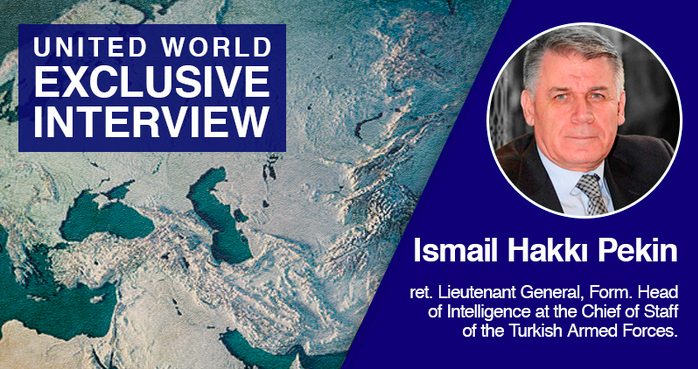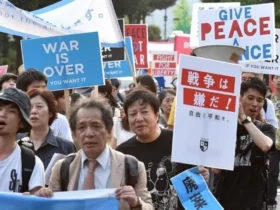Western Eurasia is witnessing intensive diplomacy traffic. US Chairman of Chief of Staff, Mike Milley visited the – illegally deployed – US troops on Syrian soil, and the US Secretary of Defense toured West Asia. China has mediated the mutual reopening of the Iranian and Saudi Arabian embassies, while Israel faces domestic turmoil. Again Beijing has taken on the scene with a proposal to mediate in the Ukraine crisis.
UWI has consulted on these issues the opinion of Ismail Hakkı Pekin, retired Lieutenant General and former Head of Intelligence at the Chief of Staff of the Turkish Armed Forces.
Let us begin with the visit of US Secretary of Defense and the Chairman of Joint Chiefs of Staff to West Asia. How do you interpret these visits?
The main purpose of these visits is to take precaution against Iran and its program of nuclear armament. The United States tries to cooperate with the government of Iraq, and at the same time, it tries to connect the Iraqi central government with the regional government of Barzani. They also attempt to include the Patriotic Union of Kurdistan and the PKK into that coalition.
Milley’s visit to the East of Euphrates is also a provocation against Türkiye. Given the circumstances of the earthquake disaster in our country, he should be ashamed of taking such a step.
More broadly speaking, Washington may create a regional chaos that can even spread to the Caucasus.
What is your impression of the situation in Israel?
There are religious groups that side with Netanyahu, and these are exercising huge pressure on his government. They want to establish a fully religious state.
Jewish circles in the United States oppose these politics. This has created a contradiction between the two sides. The opposition says that, should the judicial reform be enacted, there will be no more true elections in the country.
The conflict has gained a level, where pilots refuse the orders in the military. They claim that they are given unlawful orders. There was a lieutenant colonel in the Israeli air force, who refused to fulfill the given order to fly a bombing mission. That pilot was taken off duty, but the resistance against the aggressive-repressive policies has grown even more.
Responsible officers in the Israeli military are opposing the government’s steps. They war that such a policy of unlimited aggression would throw away the Abraham Accords and turn West Asia into hell.
There are rumors that Soros’ Open Society Foundation is behind the anti-government protests.
That may well be true. As I said, the Jews in the US oppose the judicial reform and Netanyahu’s policies. There was also the discussion about the Jewish agency in Russia, which was to be closed and which remained open. Talks are ongoing on that matter too.
At the same time, China has mediated the mutual reopening of Iranian and Saudi Arabian embassies. How do you evaluate this?
This is very good news for the establishment of peace in our region. The United States acts destructively, while China pursues a constructive policy in West Asia.
China is trying to get more influence in the region. They own the important harbor of Haifa in Israel, and they are trying to include Saudi Arabia into the Abraham Accords.
The agreement between Saudi Arabia and Iran will prove very useful and can even open up the Zangezur Corridor in the Caucasus. The West has always provoked sectarian conflicts between Sunni and Shia in our region, and it is very important to avoid these. In that sense, the opening of the embassies is very important news.
The United States on the other side tries to keep China busy in the Pacific. It has left behind a very explosive situation in Pakistan and Afghanistan. China also tries to dissolve conflicts there.
Meanwhile, on March 16, the Organization of Turkic States will convene. Its main agenda will be to help after the disaster in Türkiye. But it should also send a positive message to Russia and China, including an offer to cooperate in matters of security.
Meanwhile, China has also started an initiative for the Ukraine conflict. How big are its chances to succeed?
I think that’s difficult, because the initiative does not serve US interests. China wants a truce in Ukraine. Beijing has economic ties with Europe and the conflict affects the Belt and Road. The initiative would also benefit Türkiye’s interests.
But I do not think that the proposal has a chance to succeed. The United States has sacrificed Ukraine.
One has to take a look at the grand strategy of the United States. The U.S. wants to encircle and limit China, it uses France to counter Chinese influence in Africa and places Europe in a deep dependence from itself. Currently, the European military is running out of ammunition, and it is unable to defend itself. Europe is forced to fill the gap the US leaves.
Ties between Europe on one side and Russia and China on the other are being severed. Question is: will in the future the European market be enough for Germany, for instance, when its forced to disconnect from Eurasia?
One last question is on Turkish-Greek relations. The former Greek Chief of Staff stated that his country should make use of Türkiye’s current situation and extend coastal boarders to 12 miles. Do you think that’s possible?
No, I don’t think that such a step is possible. Türkiye would intervene immediately. And NATO would have to intervene as well.
There is an unclear situation in regards to the island of Crete, but such a step would cause great cost for Greece. A conflict between Greece and Türkiye would disrupt American plans – but it might serve German plans in the region.

















Leave a Reply